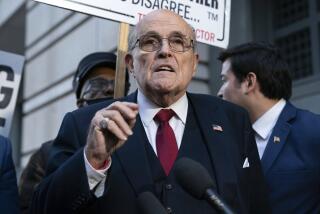Former Illinois Gov. Ryan Indicted
- Share via
CHICAGO — A federal grand jury on Wednesday indicted former Illinois Gov. George Ryan on an extensive list of corruption charges, including taking money and gifts in exchange for granting government contracts.
The indictment, the result of a five-year racketeering investigation, is the latest chapter in an ongoing scandal that dogged Ryan’s four years as governor and led him to end his political career.
Federal prosecutors allege that from 1990 to 2002 -- when he served as secretary of state and governor -- Ryan and his family took more than $167,000 worth of gifts, vacations, cash and other bribes. Officials declined to state how much allegedly went to Ryan himself.
In exchange for the payoffs, prosecutors said, the politician doled out millions of dollars worth of state business and lucrative contracts to friends and associates. The 69-year-old Republican also allegedly gave associates insider information about impending deals and ignored state employees’ concerns and complaints about such matters.
The investigation uncovered “a disturbing violation of trust,” U.S. Atty. Patrick J. Fitzgerald said during a news conference. “The state of Illinois was for sale to [Ryan’s] family and friends. This was cronyism at its worst.”
Ryan was charged with racketeering conspiracy, mail fraud, making false statements to investigators, tax fraud and filing false tax returns. If convicted on all counts, he could face more than 90 years in prison.
Ryan’s attorney, Dan Webb, issued a statement Wednesday: “I am confident he will be exonerated and a jury will find him not guilty of all charges.”
Federal prosecutors also are seeking $3.1 million in total forfeiture from Ryan and Chicago businessman Lawrence E. Warner, a close friend of Ryan’s who also was indicted.
Authorities allege that he profited from the sweetheart deals and collected money from state vendors and landlords -- some of which was funneled to Ryan.
Wednesday’s charges come in stark contrast to Ryan’s worldwide image as a leading critic of the death penalty.
As governor, Ryan put a moratorium on executions after learning that several death row inmates had been wrongly convicted.
Before he left office in January, he moved more than 160 prisoners off Illinois’ death row, commuting their sentences to life in prison.
Last month, lawmakers completed an overhaul of the state’s capital punishment system in an effort to correct what many described as a flawed death-penalty process.
The corruption probe, which began while Ryan was secretary of state, initially targeted bribes exchanged for granting driver’s licenses to unqualified truck drivers.
But the scope of the investigation expanded amid further allegations of extortion, bribery, money laundering and obstruction of justice, Fitzgerald said.
Ryan is the 66th person to be indicted in the investigation; so far, his campaign committee and 59 other people have been convicted -- including the inspector general whose job it was to uncover improprieties in the secretary of state’s office.
Ryan’s former chief of staff, Scott Fawell, was convicted of racketeering and fraud in March.
Witnesses at his trial testified that Fawell dismantled Ryan’s inspector general’s office and removed employees who complained to head off investigations into Ryan’s fundraising.
There is a long history of questionable and criminal conduct carried out from inside the Illinois governor’s mansion.
Former Cook County Sheriff Richard Ogilvie, who was governor in the late 1960s and early ‘70s, faced constant accusations of turning a blind eye to corruption: While he was sheriff, one of his top aides was paid to serve as the occasional personal driver of Chicago mob boss Sam Giancana.
Dan Walker, who served as governor from 1973 to 1977, was convicted of bank fraud and perjury after he left office. He served 18 months of a seven-year federal prison term.
In fact, five of the nine men who have served as governor over the last 50 years have been either convicted of, tainted by or acquitted of some kind of criminal activity. Two ended up in prison, one was indicted but later acquitted and two others -- including Ryan -- have wrestled with allegations of corruption.
But it was the recent racketeering scandal, and Ryan’s potential connection to it, that led to a state ethics law that went into effect last week.
The law gives a new class of inspectors general subpoena powers and the mandate to investigate complaints within the offices of all statewide officials and the Legislature.
In addition, the law also created new supervisory commissions to oversee the inspectors.
More to Read
Sign up for Essential California
The most important California stories and recommendations in your inbox every morning.
You may occasionally receive promotional content from the Los Angeles Times.













